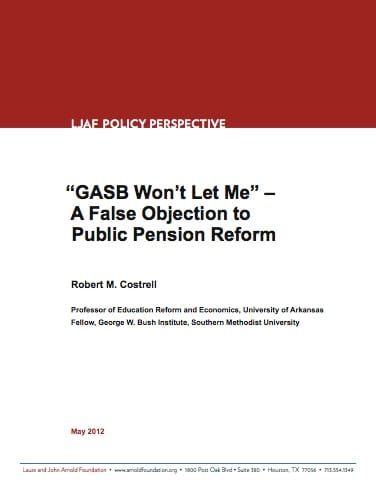 Rahm Emanuel famously remarked that “you never want a serious crisis to go to waste.” Yet that is exactly what many defenders of the defined-benefit (DB) pension system would prefer to see happen. This tough budgetary time, they argue, is not the moment for dramatic overhauls to the traditional arrangement, such as moving to a defined-contribution (DC), cash-balance, or hybrid plan. Such changes, they assert, would increase costs to the system in the short-term. This brief from the University of Arkansas’s Robert Costrell rebuts that proposition. It is dense and jargon-heavy, but its thesis is spot-on: There will be no greater costs to pension systems overall by switching away from DB plans. Not in the short or long term. (To nerd out for a moment: Costrell makes this case by profiling how various states interact with the reporting requirements of the Government Accounting Standards Board [GASB]—and what their transitions away from DB plans have actually meant for their efforts to pay down unfunded pension liabilities.) But for those seeking ammunition with which to counter-attack the most common defense of an unsustainable system, Costrell’s brief packs quite the punch.
Rahm Emanuel famously remarked that “you never want a serious crisis to go to waste.” Yet that is exactly what many defenders of the defined-benefit (DB) pension system would prefer to see happen. This tough budgetary time, they argue, is not the moment for dramatic overhauls to the traditional arrangement, such as moving to a defined-contribution (DC), cash-balance, or hybrid plan. Such changes, they assert, would increase costs to the system in the short-term. This brief from the University of Arkansas’s Robert Costrell rebuts that proposition. It is dense and jargon-heavy, but its thesis is spot-on: There will be no greater costs to pension systems overall by switching away from DB plans. Not in the short or long term. (To nerd out for a moment: Costrell makes this case by profiling how various states interact with the reporting requirements of the Government Accounting Standards Board [GASB]—and what their transitions away from DB plans have actually meant for their efforts to pay down unfunded pension liabilities.) But for those seeking ammunition with which to counter-attack the most common defense of an unsustainable system, Costrell’s brief packs quite the punch.
Robert M. Costrell, “GASB Won't Let Me” - A False Objection to Public Pension Reform (Houston, TX: Laura and John Arnold Foundation, May 2012).
